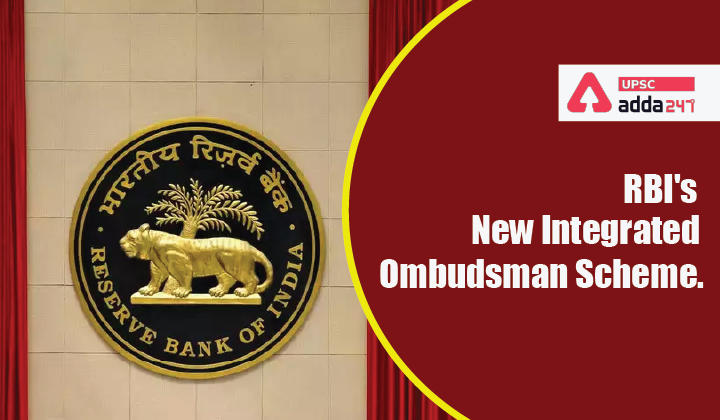”GS Paper – 3: Transparency & Accountability”
Why in News?
On November 12, 2021, Prime Minister Narendra Modi launched the Reserve Bank Integrated Ombudsman Scheme via a virtual meeting.
Background:
- Earlier, an Internal Working Group with 10 members, including eight Ombudsmen, one officer each from the Legal Department and Consumer Education and Protection Department (CEPD), was constituted to undertake a detailed review of the Ombudsman Schemes of RBI.
- And the current integrated scheme was prepared on the basis of the recommendations of the Committee set up by RBI to Review the Ombudsman Schemes.
What is new in this scheme?
- To get citizens’ financial grievances addressed will no longer have to chase different entities regulated by RBI
- There will be a single point of reference to file complaints, submit documents, track the status of complaints and receive feedback.
- The Reserve Bank-Integrated Ombudsman Scheme aims to further improve the grievance redress mechanism for resolving customer complaints
Who is Ombudsman?
- Ombudsman is an appellate body where customers can escalate complaints if the financial institution fails to address the complaint within 30 days.
- Even when customers are not satisfied with the resolution offered or explanation given by the financial institution they can approach the ombudsman.
How will this scheme work?
- The central theme of the scheme is based on ‘One Nation-One Ombudsman’.
- It will have one portal, one email and one address for the customers to lodge their complaints.
- There will be a single point of reference for customers to file their complaints, submit the documents, track status and provide feedback.
How grievances are redressed presently?
- The Banking Ombudsman Scheme (BOS) was launched in 1995.
- It has undergone five revisions and also forms the basis for the launch of the Ombudsman Scheme for Non-Banking Financial Companies (OSNBFC) in 2018 and the Ombudsman Scheme for Digital Transactions (OSDT) in 2019.
Prepared on the basis of the Recommendations of an RBI’s Integral Working Group:
- The Committee made some major recommendations with the most prominent one being the convergence of the existing Ombudsman Schemes – the BOS (as amended up to July 1, 2017), the OSNBFC, 2018 and the OSDT, 2019 – into a single integrated ”RBI Ombudsman.”
- To increase transparency and consumer awareness it had also suggested broad-base the grounds of complaints and incorporating only a detailed ‘negative’ or ‘exclusions’ list for rejection of a complaint.
- The time taken in resolving the complaint was also an area of concern for the committee which recommended a reduction in the turnaround time (TAT) for complaint resolution to 30 days in a phased manner over a period of two years.
Possible Benefits of the New Scheme:
- The strength of a democracy lies in how easy and quick the grievance redressal mechanism is. In that aspect, the RBI’s integrated ombudsman scheme is a major step.
- No matter the nature of the financial grievance, the complainant can lodge it online, and track it online for a time-bound resolution process.
- This one nation –one ombudsman scheme will directly help 440 million loan accounts and 2.2 billion deposit account holders, he said.
- All RBI regulated entities will be covered by this.
- Any complaint by account holders can be resolved through this one platform.
- In case of online fraud, cyber fraud, etc., the RBI will massively use artificial intelligence.
- Banks and investigative agencies will coordinate in the shortest time possible to resolve a fraud.
- This will not only help in preventing fraud but will also improve digital penetration and customer confidence in the banking system will increase.



 TSPSC Group 1 Question Paper 2024, Downl...
TSPSC Group 1 Question Paper 2024, Downl...
 TSPSC Group 1 Answer key 2024 Out, Downl...
TSPSC Group 1 Answer key 2024 Out, Downl...
 UPSC Prelims 2024 Question Paper, Downlo...
UPSC Prelims 2024 Question Paper, Downlo...




